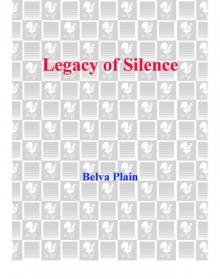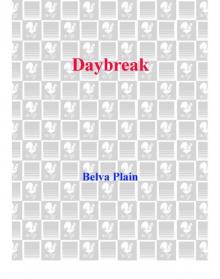- Home
- Belva Plain
The Golden Cup Page 12
The Golden Cup Read online
Page 12
Across from Hennie, the young girl opened her purse.
“Here’s a mirror, if you want to look at your mug.”
“Maybe I’d better not, since I can’t do anything about it. But thanks anyway.”
The girl shrugged. Holding the mirror up toward the weak glare of the ceiling bulb, she examined her own painted face. Not more than seventeen, Hennie thought. A doll’s face, with dimples.
Olga, who had been sitting with her head in her hands, raised it and leaned it against the wall. Her closed eyes lay in dark blue hollows.
“Are you all right?” whispered Hennie.
Without opening her eyes, Olga whispered back, “Leah. Little Leah.”
“She on strike too?” her neighbor inquired.
Hennie answered for Olga. “Yes. She’s not well.”
“I see that. I’m in for lifting. A pair of gloves. They caught me this time. Only the second time, though.”
Some of the strikers in the next cell began to sing. Starting low at first, they raised their voices a shade and finally burst out singing: of freedom, of bosses, wars, love, and peace. All that energy, that strength, that spirit! Hennie felt none of it now; she was exhausted. The pain in her head was mounting. It was a relief when an officer came pounding down the hall and made them stop singing.
The minutes passed. Two hours must have passed. Her watch had been broken in the scuffle and she could only guess the time. Where was Dan? Suppose they hadn’t reached him? How hard would they try, without a telephone?… He would be frantic. Would he think of looking for her here? No, of course not.
The minutes passed. It was just as well that she did not know the time, for it would have been unbearable to watch it pass.
After a while a policeman came and unlocked the grating. Everyone except the poor old derelict, who lay asleep in her woolen rags, started up in hope. But it was only some supper.
“Thought you ladies might be wantin’ your evenin’ meal. Here’s a nice lot of bread for yez and a drink of good cold water.”
He put the dishes on the end of the bench, where the stench from the slop buckets rose to hover over the bread. Hennie gagged.
“Not to your likin’, missus? You were wantin’ turkey, I’ll bet, were you not?”
Hennie, choosing to ignore the sarcasm, was about to ask whether any message had come from her husband, when the young girl let out a frightful screech and scrambled up on the opposite bench, raising her soiled lace ruffles.
“A rat! Oh, Jesus, a rat!” Her teeth chattered. “He went behind there—” And she pointed toward one of the slop buckets.
The policeman kicked the bucket aside, splashing some of its contents on the floor. There, indeed, was a hole where the wall met the floor. He threw up his hands.
“Poor thing, come in out of the cold. Better eat your nice dinner, ladies, before he comes back and eats it for you.”
Hennie shrank on the bench, drawing her skirts in. For God’s sake, where was Dan? What, oh, what could be keeping him?
She waited. Hennie, in a cell. No matter what, even if she had to stay here all night, she mustn’t panic. Mustn’t. Wouldn’t. After a long time she became aware that her teeth were clenched and her hands were balled into fists, thrust into her pockets.
Surely it must be very late by now. The old woman, rousing from sleep, went to squat on a bucket. Olga had scarcely moved, except to stir a little and patiently sigh. The other two women were silent. Like Hennie, they waited. Surely it must be very late …
And then she heard Dan’s voice. From far down the corridor it rang, and at the sound of it her first tears came. Roughly, she wiped them away and was dry-eyed when he appeared. She flung her arms around him.
“I thought you would never come.”
“Wait till we’re outside and I’ll explain. Paul’s here, taking care of things at the desk for you and your friend.”
“Olga,” Hennie cried, “come, dear. This is Dan and it’s all right, you’re free. Come along, we’ll take you home.”
“What have they done to you?”
Dan was aghast, and Paul, who was waiting at the street door, opened his eyes in astonishment.
“Do I look so awful?”
“Yes. I want to take you to a doctor right away.”
“No, please, I want to go home. Nothing’s broken. I need some ice on it. And a hot bath, and some hot tea. Paul, this is my friend, Olga Zaretkin. My nephew, Paul Werner.”
Paul bowed. In his velvet-collared overcoat, with his cheerful young face, he might have come from another continent to stand on this grimy street.
His sleek little auto was at the curb. He covered the women with a lap robe.
“It must be close to zero out, let alone the wind. Where shall I take you?” he asked Olga.
She murmured, “You go down Grand Street, it’s left around the corner, then you go—I’ll show you.”
These were the first words Olga had spoken in two hours, Hennie realized. How ill she is, she thought, and there is nothing to be done about it.
Nothing to be done either for the three left behind in the jail. Each of them had been there before, each would be there again; the horror was overwhelming.
“What happened,” Dan explained, “was that when you didn’t come home, I went all over looking for you. I thought maybe you’d gone to the settlement, so I went there. I thought maybe you were at a conference in Freddy’s school. I asked everyone in our building who might know. I even went to your mother’s; I took Freddy—”
“My mother knows?” Hennie cried.
“She does now. After I left her, she telephoned Paul, who’d just got home on his winter break. He picked her up and they both came to our house, just about the time a cop from the precinct arrived to tell me about you.” Dan reached back from the front seat and grasped Hennie’s hand. “Don’t be afraid about tomorrow. The magistrate will give you a fine and a lecture and you’ll go home. Of course, he might not be as lenient a second time.”
“This is the house,” Olga said abruptly.
They drew up in front of a tenement indistinguishable from the others on the street. The sky, filled with the threat of snow, pressed down on the squat roofs; the street, with the pushcarts taken in, was dead.
“No, wait here,” Hennie instructed Paul and Dan, who were prepared to go inside with the women. “I’ll just see Olga upstairs and be right back.”
She would not say in Olga’s hearing that on these silent streets there were people who prowled, who would take perverted pleasure in damaging Paul’s treasured auto.
The sewing machines whirred to a halt the instant they walked into the third-floor flat. Four men and women in gray middle age, and three pale boys, stopped work. Seven pairs of eyes stared.
“So what happened to you? The strike again?”
“Let her sit down,” Hennie said. “She’s about to drop.”
Someone moved a pile of woolen pants from a chair.
“So, sit. You want some hot tea?” A woman, evidently the mother of the family, got up. “You look terrible. Frozen.”
“I am.” Olga removed her hat. “Frozen.”
“She’s a sick woman.” One of the men sighed, and adjusting a seam under the needle, began to work the treadle again. “Very sick.”
Olga began to struggle out of her coat.
“Keep it on,” Hennie told her. “Let yourself warm up first.”
“But I’m also burning. Where’s Leah?”
“I sent her for milk,” the woman answered.
She brought tea; Olga warmed her hands around the glass and drank. There being no place to sit, Hennie stood. Now she saw that there were two more children, quite young, asleep on another pile of clothes near the window. The light from the kerosene lamps was a sickly yellow; one’s eyes must hurt, sewing in such light. Often enough Hennie had been in flats like this, yet somehow never seen one as clearly as now. The stifling air smelled of stale grease and unwashed bodies.
I
would lose my sanity if I had to live here, she thought.
Snow had begun to shower against the window, and Paul was waiting. She was preparing to leave when the hall door opened and a little girl came in, carrying a pail and shaking snow off her coat.
“Leah,” said Olga, opening her arms.
The child, who had brought a fresh, pure cold into the fetid room, stood staring at her mother.
“Mama! Are you sick again?”
Hennie said quickly, “Mama’s all right. She had to come home, but she’s all right.”
“Yes, I’m all right,” Olga repeated, adding, “don’t worry, Leah,” for the girl’s large eyes had opened wide in alarm.
She knelt beside her mother. “Has something happened to you, Mama?”
“I’ll tell you later. We mustn’t keep my friend waiting, she brought me home. You remember her, my friend Hennie I always talk about?”
Leah looked closely at Hennie. “I remember you. You gave me lemonade once at the settlement house.”
Olga looked up at Hennie. Proudly and tenderly the look said, You see, you see …
She had not exaggerated. Rather, she had not said enough, Hennie thought, for this was a child you would turn back to look at. Something pulled you toward her, something immediately vibrant and warm. Reddish hair made a tiara of loose curls around her head; each silky cheek held a dimple. Most striking was her look of health, as if she had come from days of milk and sun on a farm. How long would she keep that radiant look?
The child was studying Hennie in return. “You came in the auto,” she said.
“Yes, it’s my nephew’s,” Hennie replied, and felt shame, which was absurd for, in the first place, the auto was not hers, and in the second place, why should Paul not own it? He had not stolen it, nor harmed anyone.
All this spun through her mind, repeating a thought that would be with her all her life, wherever there was a juxtaposition of wealth and poverty.
The child went to the window to look out. The man working at the window was amused.
“Look at her! She likes the auto. Maybe you’d like to have one like it, hey, little one?”
Olga shrugged. “Autos! All I ask is enough food to keep up our strength and I’ll gladly walk.”
Hennie put her hand on Olga’s bent shoulder.
“Try to take care of yourself.” Foolish, futile counsel! “If there’s anything I can do …”
Olga shook her head. “For me, nothing. Only for Leah.” Her voice was filled with tears.
“I know. I promise.”
Yes, there was something about Leah Zaretkin, eight years old. One of the golden ones, Hennie thought; you don’t know how to describe what it is, it is just a sort of emanation, a bright glow. Dan has it. Paul has it.…
And her heart went out to the child.
Hennie dozed and woke with a painful throbbing in her nose and jaw, which had been pressed into the pillow.
In a chair next to the bed, Dan sat and watched. He had called the doctor from the drugstore telephone, brought medicine, brought supper on a tray, renewed the icebags, and warmed her with his enormous pride.
“I thought maybe you’d be angry,” she said now.
“Angry? Yes, at the thugs and at the police who aren’t much better than thugs. I’m only thankful you’re not hurt worse.” His eyes glowed with admiration. “You’ll see, though, it will have been worth it. Oh, it won’t be solved overnight! The employers will give in a little for the sake of getting work started again, and there’ll be more strikes. But eventually the law will regulate conditions. And it will be your courage that began it.”
It started to snow again. Then came sleet, pattering on the window. Dan pulled the blankets closer around her shoulders as she slipped back into a half doze.
My courage, he says. But I’m not brave. I was scared to death. I’m even more scared now when I think of it than when it was happening.
Why do I do these things? Because I want to help and I know it’s right. Of course. Yet there’s something else … I think … I know it’s that I want to feel important. I want Dan to praise me. He loves me … but I want him to praise me too.
Suddenly she sprang out of bed into the shock of cold air and went to the mirror over the bureau.
“What on earth are you doing, Hennie?”
“I want to see how I look.” Tilted, the lamp threw a sallow beam on her face. Ignoring the swollen side, she analyzed herself. It is only expression that makes my face attractive, she thought, for what might have been the thousandth time; the features are too bold, too flawed, the eyebrows too thick. When I smile and my mouth curves, I am at my best. I should remember to do that more often.
“In a day or two you’ll be fine. Well, to be truthful, in a couple of weeks you’ll be fine. Does it hurt so much?”
“Not much.”
“Come back to bed before you freeze. I don’t know why you don’t fall asleep. The medicine’s supposed to make you sleep.”
“It’s because I can’t get that child out of my mind. If you could have seen that vivid little face, Dan, and that miserable room, all grime and gray—”
“I know, I understand. But there’s nothing you can do, so you really must try to stop thinking about her.”
“You see, I sort of promised Olga that I would take care of Leah.”
“What? How can you take care of her? You shouldn’t have made such a promise!”
“Those people won’t keep her when her mother dies. How can they? They’re probably feeding her and Olga for nothing now. I’m sure they expect to be repaid when the strike’s over.”
“I’ll tell you what you can do. You can keep in touch, and when it happens, when the mother goes, you can make arrangements at the orphanage.”
Those bleak places. Gloomy, dark red brick. Stingy little windows. Regiments, armies of children, walking two by two. Oh, no doubt they were kind enough in those places, after their fashion …
Now came Olga’s despairing face, her shivering hands pulling the collar around her throat, and her despairing cry: What will become of the child?
Can you allow a little girl like her just to go to waste?
Hennie, there are thousands of them.
Yes, but I don’t know them all.
Hennie, what can you possibly be thinking of?
I am imagining that I am dying and there is no place for Freddy to go in this jungle of a world.
Freddy. What will he think?
He has the softest heart. She wouldn’t interfere with him.
Tell the truth, it is because you haven’t had any more children.
If I had a girl, if I had Leah, I would send her to school, dress her up in yellow, in white, in red. I would spoil her in a way I never was.
Dan’s warm hand stroked her forehead. “Close your eyes. Try. Let yourself float away.”
Hennie’s eyes flew open. “We could adopt her. I don’t mean legally or anything like that, I mean, just take her.”
“Here? Into our family?”
“Why not? We’ve wanted another child and nothing happens.”
“It’s late now. Freddy’s almost grown.”
“It’s not too late. You wouldn’t say so if I were pregnant.”
“Well, but you’re not and it’s a big step. Your heart is wrung, I understand. But you’d better do a lot more thinking.”
“I have thought.”
“Well, think some more.”
“You don’t want me to do it and I should think you would be the first one to want it, you of all people.”
“Ordinarily, yes, but in our case, with Freddy the way he is—”
She cried sharply, “What do you mean, the way he is?”
“Freddy has a long way to go and it may not be easy.”
“What can you be saying? There’s nothing wrong with Freddy.”
“He’s complicated. He’s different. You know it as well as I do, Hennie, but we’re afraid to talk about it.”
“
I’m not afraid of anything and I don’t know what you’re saying.”
If you don’t talk about it, perhaps it will go away.
“He’s a sensitive child, of course, I know that, Dan, but does that make him—strange?”
“It makes for a more uncertain future,” Dan said quietly.
And she said, hearing the bitterness in her own voice, “You want him to be like Paul.”
And so do you.
“I never said that, Hennie.” There was a long pause. “It’s been quite a day and I’m tired out. I’m going to go see how Paul and your mother are doing.”
He opened the door. Quiet, considerate voices came from the parlor.
“Is Mama furious?”
“Not at all. She surprises me. She hasn’t said one angry word.”
“I would have expected her to blow up.”
“Too shocked, I suppose. Paul says the blowup will come next week, after she’s had time to think about it.” Dan hesitated. “I didn’t mean to be short with you, Hennie. I only meant it’s a staggering responsibility to take another child, a strange child. Frankly, I don’t want to do it. But if you … well, you ought to be very sure you know what you’re undertaking.”
“Oh, I am, I am!”
And it seemed to Hennie, as she lay alone waiting for sleep and relief to come, that the child’s face was floating, beckoning so sweetly, so brightly there, in the hazy darkness just beyond the window: I’m waiting for you, when it’s time, when you’re ready, I’m waiting.
Paul was stretched in Dan’s easy chair in the parlor. An amazing day! Wait till he told his friends! Bailing one’s aunt out of jail! Her friend, that other woman, poor thing, she’d been frail as a blade of grass. God, it made you sick to see such misery … and it was so like Hennie to take the trouble … he remembered the family tales of Hennie’s childhood, about how she rescued sick cats and once brought a lost little boy home to her house. She’d been lucky today, though, and ought to be more careful; a picket had lost an eye a while ago in just such a labor brawl as this one. He’d read about it in the Times.
He closed his eyes, feeling half asleep. His grandmother and Freddy were sitting on the sofa talking, or rather, she was talking and Freddy was listening, fascinated, with a bowl of uneaten pudding on his lap.

 The Golden Cup
The Golden Cup Her Father's House
Her Father's House Whispers
Whispers Crescent City
Crescent City Legacy of Silence
Legacy of Silence Crossroads
Crossroads Promises
Promises After the Fire
After the Fire Tapestry
Tapestry Looking Back
Looking Back Heartwood
Heartwood The Carousel
The Carousel Fortune's Hand
Fortune's Hand Homecoming
Homecoming Random Winds
Random Winds Harvest
Harvest Evergreen
Evergreen Treasures
Treasures The Sight of the Stars
The Sight of the Stars Secrecy
Secrecy Daybreak
Daybreak Eden Burning
Eden Burning